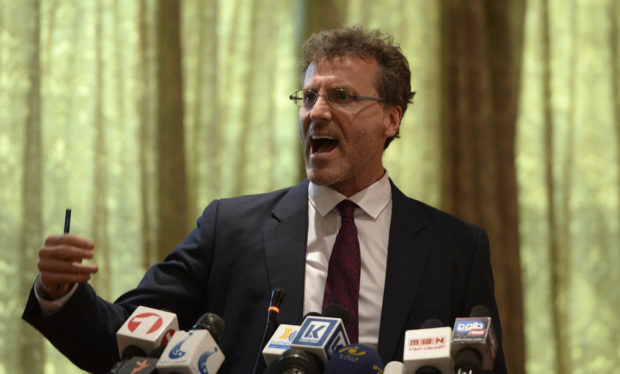
VAGUE MESSAGES Phelim Kine, Human Rights Watch deputy director for Asia, says President Duterte has sent vague messages about his campaign against loiterers, increasing the likelihood of abuses. —AFP
President Rodrigo Duterte’s vague messages have caused confusion and led to police abuses in his crackdown on loiterers, a New York-based human rights group said on Tuesday.
In a statement, Human Rights Watch (HRW) deplored how the Philippine National Police drive against loitering had targeted only the poor.
“The [PNP is] conducting a ‘crime prevention’ campaign that essentially jails low-income Filipinos for being in public [while] President Duterte has sent vague messages about the campaign, increasing the likelihood of abuses,” said Phelim Kine, HRW deputy director for Asia.
Kine expressed concern that the PNP was again demonstrating its preference for wielding fear, intimidation and arbitrary arrest to target vulnerable communities rather than respect for the rule of law.
Basic rights
“The Philippine government should protect the basic rights of all Filipinos rather than let the police demolish them on the pretext of a ‘crime prevention’ campaign,” Kine said.
HRW noted that the PNP had focused its campaign against loitering on the same low-income communities that had been the “epicenter” of the President’s brutal war on drugs.
More than 7,000 people, all of them poor, have been arrested since the President launched the crackdown on loiterers on June 13.
The PNP scaled down the campaign after backlash erupted, and the President disowned having ordered the crackdown, HRW said.
But the confusion is caused mainly by the President’s conflicting statements, it said.
“He ordered a ‘strict’ crackdown against loiterers whom he also warned constituted ‘potential trouble for the public.’ Then on June 22, he said he never ordered the police to arrest so-called loiterers,” HRW said.
Protecting citizens
But Malacañang defended the President’s directive, which now covered minors, stressing that it was the government’s duty to protect citizens.
Presidential spokesperson Harry Roque, echoing the President’s sentiments, on Tuesday cited the principle of parens patriae in justifying the order to take into custody minors roaming the streets.
Parens patriae is the principle that political authority carries with it responsibility for protection of citizens.
“That’s only right, because the President said they (minors) can be picked up by the police and turned over to the barangay or social workers until they are fetched by their parents,” Roque told reporters in Davao City.
Presidential legal counsel Salvador Panelo, also citing the parens patriae principle, said Mr. Duterte was trying to protect citizens.
“You know when minors loiter or drink liquor, then you’re creating a situation where crimes will arise from that,” Panelo said in a television interview in Manila.
“And it’s not against the law when you accost for instance minors in the streets,” he said.
Children’s second parent
In Davao, Roque said the President could not tolerate children roaming the streets, especially at night.
“That’s only right, because in the exercise of parens patriae, which the President himself cited, the government is also the second parent of these children,” Roque said.
In a speech in Cagayan de Oro City on Monday night, the President, citing parens patriae, directed the police to take into custody people under 18 found loitering, especially late at night.
Roque explained that the minors would not be arrested, but turned over to the Department of Social Welfare and Development or barangay officials, who would release the children to their parents and tell them to keep the kids at home.
Argoncillo case
The President’s crackdown on loiterers turned ugly on June 15 with the death in police custody of 22-year-old Genesis Argoncillo in Novaliches, Quezon City.
Police arrested Argoncillo for going out shirtless to buy cell phone credit. His sister claimed the police maltreated Argoncillo, but the police said he died after being beaten up by two inmates in the city jail.
On Tuesday, opposition lawmakers introduced a resolution in the House of Representatives for an inquiry into Argoncillo’s death.
The President, speaking at a gathering of barangay leaders from Northern Mindanao in Cagayan de Oro City on Tuesday, said police and soldiers had nothing to worry about and not to mind the critics of his campaign against loitering
“Don’t be afraid, I will protect you,” the President said. “Your job is not to read but to follow orders.” —With reports from Jerome Aning and Divina Suson

